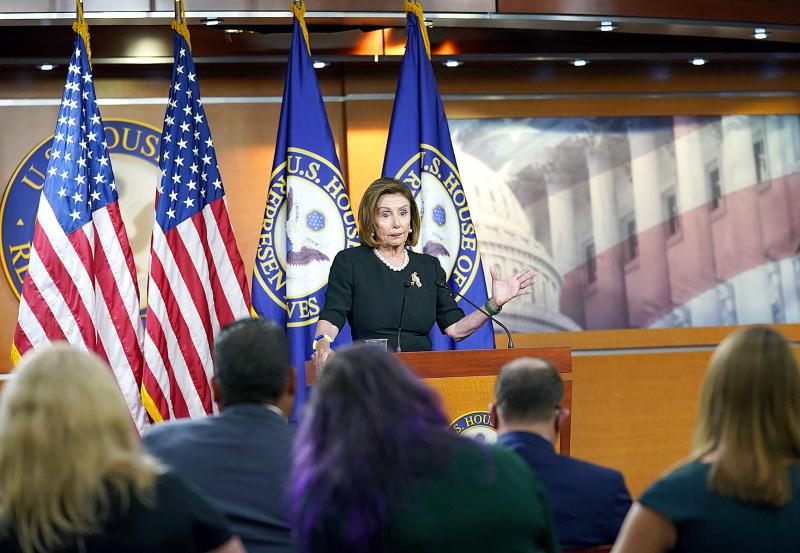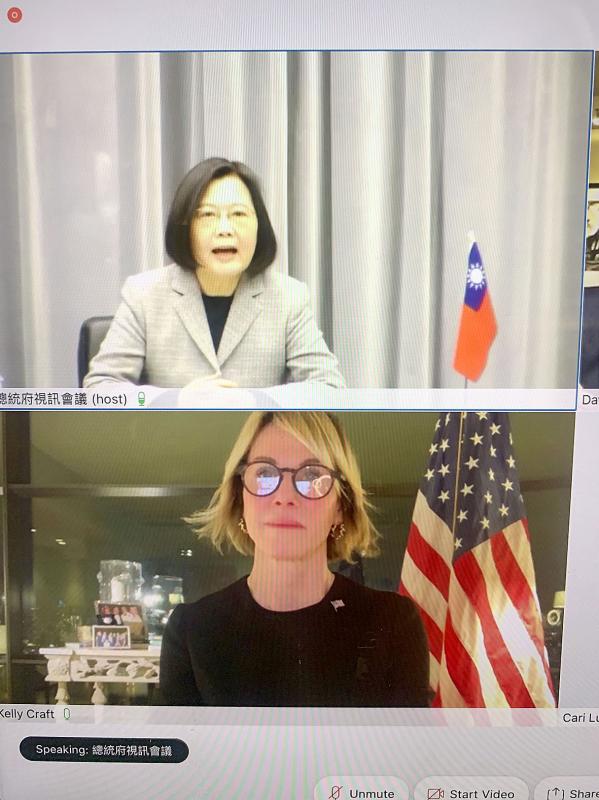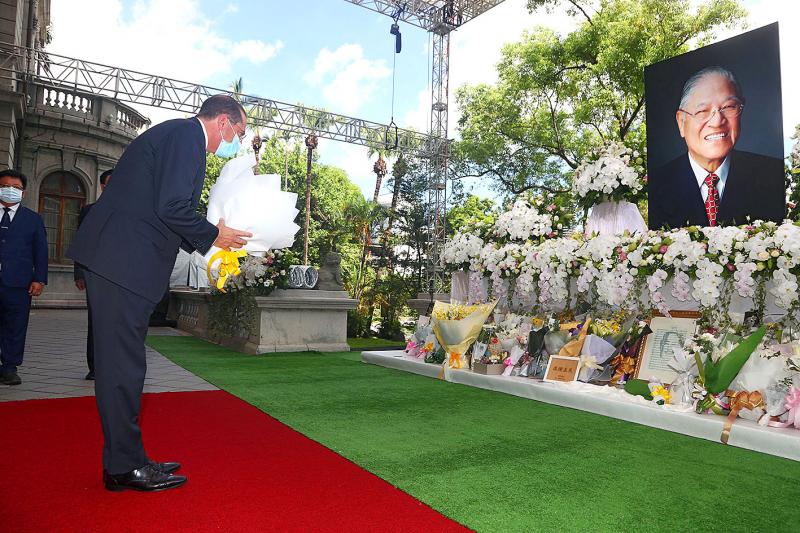The newspapers are full of the story of the possible visit of US House Speaker Nancy Pelosi next month. For example, on Thursday, The New York Times reported, a Chinese Foreign Ministry official in Beijing said that the “visit undermined relations between Beijing and Washington and warned that China would respond ‘as necessary.”’
Oh no, wait. That was from September 2020, when there was a high-level visit to Taiwan by a US official. I bet none of my readers can remember who it was.
Zhao Lijian (趙立堅), China’s foreign ministry spokesperson, said that “What the US has done seriously violated its commitment on the Taiwan issue.”

Photo: AP
Sorry, confused again. That was from August of 2020, when the US Health and Human Services Secretary visited. That jaunt was billed as the highest-level US official visit since 1979, when the US switched recognition to China. What was his name, again?
Right, now I know! Beijing warned the US it was “playing with fire.” My apologies once again, that was the canceled visit of the US Ambassador to the UN (who?) a couple of years ago. Later she videoconferenced with President Tsai Ing-wen (蔡英文).
My, we’ve come a long way since US State Department officials cravenly objected to pixels forming an image of then-president Chen Shui-bian (陳水扁) appearing at the National Press Club, back in 2007. People wonder what good visits like Pelosi’s do. For one thing, they normalize face-to-face contacts, making other forms of contact, such as videoconferencing, purely routine, beneath comment.

Photo: The United States Mission to the United Nations via AP
Here it is: China expressed “strong dissatisfaction and firm opposition” and said it would not allow any external force to interfere in its “internal affairs.” Sorry! That was the delegation led by the awesome Senator Tammy Duckworth in May.
Aha! Zhao said on Thursday that “China is firmly opposed to any form of official exchanges between the US and Taiwan.” Nope, that was for the delegation led by Senator Lindsey Graham in April.
When the Taiwan Travel Act was passed in 2018, the US sent a state department official to Taiwan. China made its usual boilerplate complaints — just mash-up any of the comments above to replicate them. It whined too when the act was passed.

Photo: Reuters
Remember the Tsai phone call to president-elect Donald Trump? “Human sacrifice! Dogs and cats living together! Mass hysteria!” For about three days, everyone was suddenly a China-Taiwan expert, complete with references to 5,000 years of history, long-term orientation and Sun Tzu (孫子). Jia Lynn Yang, then the Washington Post’s Deputy National Security Director, tweeted: “Just got back from a week in Taiwan. Tensions with China are really high, so this is just extraordinary.”
Where are those horrible consequences we were all promised? Promised repeatedly over the years, for each and every official interaction, which always and inevitably occur during periods of “high tensions.”
When else could they occur? Something is always happening with China, because the two enormous powers have many points of friction in their complicated adversarial relationship.
This horror of tensions, trundled out by Serious People whenever contact between the US and Taiwan may occur, goes something like this: when things are quiet: don’t rock the boat. When things are tense: don’t add to tension. The operative word is always “don’t.” Since China’s response determines the level of tension, worries about tension essentially cede US maneuver space to China.
For years we were told that the presence of US troops on Taiwan was a “red line.” Then it was revealed that there was a small contingent of US troops on Taiwan doing training. The red line goalposts were quietly shifted. Looks like the US can salami slice too.
Note that China’s foreign policy is so deft, no action it takes ever causes tension with the US, at least in our media. Bunch of foreign policy geniuses over there in Zhongnanhai, eh?
As of this writing it is not clear whether Pelosi will be visiting. Mid-week, the State Department said it had no clue. Asked about a trip, State’s spokesman averred: “ I am not aware that the speaker’s office has announced any forthcoming travel, so I would need you — to refer you to the speaker’s office to refer to any potential travel she might undertake.”
US President Joe Biden was also asked about Pelosi’s visit. Biden was widely quoted as saying “The military thinks it’s not a good idea right now.”
This was greeted with the inevitable jeers that Biden was being woolly again.
People are too quick to assume that the president, who has been in politics for decades, can’t express himself. Perhaps Biden was being as precise as he needed to be.
In his usual informal language, Biden did two things. First, he distanced himself from the possible visit. Second, by attributing it to the vague “the military” he distanced himself from objections to it. The State Department did that as well. Pelosi going to Taiwan? Shrug. That’s her business.
This in turn has two potential effects. It reduces the “officialness” of the trip, and it gives Pelosi space by taking weight off her shoulders.
Meanwhile, with all eyes on visits by Pelosi and others, the US has quietly implemented a policy observers have been recommending for years: breaking up arms packages into smaller sales occurring regularly. Just in the last year the US approved sales in August, and again in February, April and last month, none over US$750 million. The flurry of noise over official and Congressional visits has obscured this laudable development.
The problem with Pelosi’s potential visit is that it does not appear to be part of any long-term, coherent US strategy to help deal with all of the problems that Taiwan faces in its daily struggle just to be seen as a state in the international community. The Congressional visits are not tied to any other aspect of the US-Taiwan relationship. But perhaps that’s intentional.
Such visits do raise Taiwan’s profile in the US and in the world, and their bipartisan nature helps prevent Taiwan from becoming a partisan issue in US politics. The Congressional visits are necessary, and a powerful signal. Personal contacts have a huge influence on foreign policy commitments. We will need the support of Congress if we are to get the flows of weapons and munitions Taiwan requires.
Necessary, but insufficient.
Pelosi or no Pelosi, the beat will go on out here. The grayzone tactics will continue, the sand dredgers, the relentless attacks on Taiwan’s international space, the disinformation flows, the misrepresentations of Taiwan on items printed in China, the ADIZ incursions, the threats — nothing will change.
When Beijing wants to move on Taiwan, it will cite something the US did as its excuse. This too will be deliberate strategy, not only to put the onus on Taiwan and its allies, but also, to activate the networks of speakers in the media and other public spaces that will present its arguments for it.
As the brouhaha over the Pelosi visit shows, these people are already very well-trained.
Notes from Central Taiwan is a column written by long-term resident Michael Turton, who provides incisive commentary informed by three decades of living in and writing about his adoptive country. The views expressed here are his own.

Taiwan has next to no political engagement in Myanmar, either with the ruling military junta nor the dozens of armed groups who’ve in the last five years taken over around two-thirds of the nation’s territory in a sprawling, patchwork civil war. But early last month, the leader of one relatively minor Burmese revolutionary faction, General Nerdah Bomya, who is also an alleged war criminal, made a low key visit to Taipei, where he met with a member of President William Lai’s (賴清德) staff, a retired Taiwanese military official and several academics. “I feel like Taiwan is a good example of

March 2 to March 8 Gunfire rang out along the shore of the frontline island of Lieyu (烈嶼) on a foggy afternoon on March 7, 1987. By the time it was over, about 20 unarmed Vietnamese refugees — men, women, elderly and children — were dead. They were hastily buried, followed by decades of silence. Months later, opposition politicians and journalists tried to uncover what had happened, but conflicting accounts only deepened the confusion. One version suggested that government troops had mistakenly killed their own operatives attempting to return home from Vietnam. The military maintained that the

Jacques Poissant’s suffering stopped the day he asked his daughter if it would be “cowardly to ask to be helped to die.” The retired Canadian insurance adviser was 93, and “was wasting away” after a long battle with prostate cancer. “He no longer had any zest for life,” Josee Poissant said. Last year her mother made the same choice at 96 when she realized she would not be getting out of hospital. She died surrounded by her children and their partners listening to the music she loved. “She was at peace. She sang until she went to sleep.” Josee Poissant remembers it as a beautiful

Before the last section of the round-the-island railway was electrified, one old blue train still chugged back and forth between Pingtung County’s Fangliao (枋寮) and Taitung (台東) stations once a day. It was so slow, was so hot (it had no air conditioning) and covered such a short distance, that the low fare still failed to attract many riders. This relic of the past was finally retired when the South Link Line was fully electrified on Dec. 23, 2020. A wave of nostalgia surrounded the termination of the Ordinary Train service, as these train carriages had been in use for decades